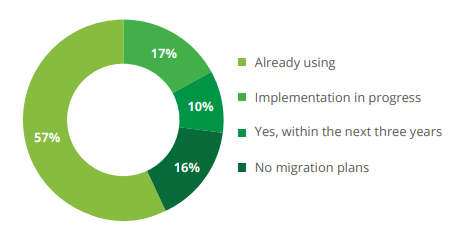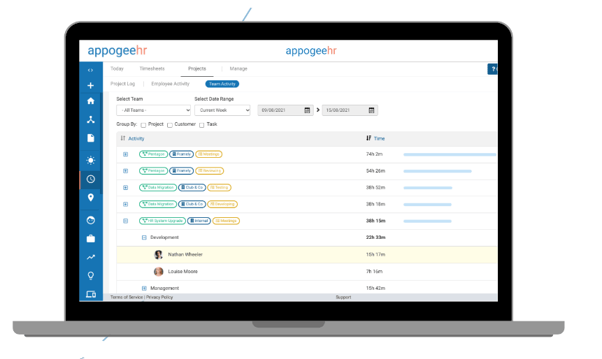What are the benefits of employee time tracking?
Time-based tracking doesn’t just create the conditions for better planning and milestone marking, it can help to create lots of valuable employee performance data as well as bring better HR systems integration – around elements such as sickness absence, holiday booking, onboarding, and document management.
Not only does it benefit management and help organisations become more efficient. Tracking time spent on the activity of work has a benefit to employees too.
Increasing data suggests that time tracking helps to provide staff with an all-important structure (incorporating giving them the much-needed feedback they crave when they are doing well), as well as being an important employee safeguard.
HR digital transformation and employee time management
HR digital transformation is leading the way. Automating key business functions, such as employee and project time tracking, is having a major impact on businesses, no matter how small or large.
Having real-time data helps you to make those all-important strategic decisions. In fact, 74% of businesses are either already using a cloud-based solution, or are underway to support their HR function.

The importance of employee time tracking
For businesses with hourly employees, tracking employee hours is essential. Why? Well, if you don’t, there's no way of knowing how much you should pay your employees for their time worked, whether they overworking their contracted hours, or even falling short.
Businesses with salaried employees can find employee time tracking extremely useful, too. Make better staffing decisions by understanding employee costs and knowing your employees better. Do you know how individual team members are performing and how quickly tasks are completed? What aspects of their workload they’re struggling with?
Time and location tracking can help you:
- Accurately manage time and attendance. Let staff clock in and out when they’re working and taking breaks, while also being able to select activities or projects that they’re working on. This helps your managers easily monitor staff working hours to see whose hours are exceeding normal hours and who's not taking breaks, to help monitor signs of overwork, stress, and burnout.
- Keep up with remote workers. Easily see where employees are working regardless of location by allowing staff to record when they’re working from home. Making it even easier to see who’s available for face-to-face meetings or video chats.
- Identify what areas of your organisation need improvement. Time tracking helps you take immediate action on areas that need improvements and more resources. Use the data to assign the right tasks to the right people or assign staff to cover a period of employee absence.
- Understand employee data regardless of work location. Manage remote and hybrid workers by planning and reporting on where your employees are working for easy office capacity management. Remote workers can record their working hours without being tied to a physical location. Monitor leave and staff sickness at the touch of a button.
- Analyse actual project data. Understand exactly how much time a previous project activity took, especially if the activities are similar. Time tracking data allows you to accurately estimate the costs of future projects.
- Save valuable time. Time tracking software saves time: 50% of professionals* who do not have automated systems, (for example, time tracking) say manual data input and data adjustments are the most time-consuming parts of the process. [source: Deloitte - Global payroll benchmarking survey*]
Simplify the way employees work–regardless of location across multiple projects simultaneously.
What can employee time tracking show you?
Do you know that businesses waste $7.4 billion* each day on unproductive tasks, such as finding a missing document, checking social media, or waiting for colleagues to turn up for a meeting? [source: Finances online*]
Employee time tracking software monitors how much time employees spend on unproductive activities, as well as how long each employee is away from their computer, so you can prevent the same from happening to your organisation.
Track employee time linked to a type of activity, such as administrative, training, or direct project work. First-class time tracking solutions offer more specific tracking features, such as writing a proposal, performance review meetings, and much more. It will show you exactly where time is being spent and help improve any repetition, such as duplication of tasks across teams.
Combine HR data with employee time tracking–it’ll help you answer the following questions:
- Whose skills are not being used properly for project-based work?
- Which employees aren’t taking their full quota of annual leave?
- Who has the capacity for new learning and development or can take on additional tasks?
- Which teams are taking the most amount of sick leave?
Generate reports to assist with staff performance development reviews. Employee time tracking will give a complete overview of each employee’s workload. Save time manually preparing data by using employee time tracking for your business.
The benefits of employee time tracking
Ready to learn more about employee and project management time tracking software? Here are five benefits to help you make the switch from manual to automated systems.
1. Remain compliant with employment laws and regulations
Employee time tracking allows you to remain compliant with current employment laws and legislation.
The maximum weekly working hours directive, for example, sets out the maximum number of hours each person should work each week. Similarly, the Employment Rights Act 1996 covers the rights of employees in situations such as dismissal, paternity leave, maternity leave, and redundancy.
Employee time tracking offers a perfect solution for making sure your business is complying with employment legislation by:
- Monitoring the number of hours each employee is working over a given period
- Tracking sickness absence and identifying any patterns
- Planning for paternity or maternity leave
- Helping you follow your organisation’s policies and procedures, such as flexible working or managing attendance.
2. Monitor how employees are spending their hours
According to Forbes, the average employee steals an average of 4.5 hours every week, resulting in almost six weeks a year and costing businesses more than $11 billion a year.
Time theft occurs when an employee accepts pay for the time they haven’t worked, such as:
- Taking longer breaks and lunches than entitled
- Claiming overtime that hasn’t been worked
- Buddy punching (having a colleague clocking in or out for them)
- Rounding up their working hours' timings. For example, saying they started work at 09.00 a.m. when it was actually 09.05 a.m.
Check what your employees are spending their time on and pinpoint the factors that harm productivity. Let’s take unpaid overtime, for example. UK employees worked £24 billion worth of unpaid overtime in 2020. Time tracking solutions help you understand exactly how much overtime your staff is working.
Analyse management reports to understand what changes you can make to simplify employee workload.
3. Prevent employee overload and burnout
According to People Management, some 12.8 million working days are lost to work-related mental health problems. Most of these absences were categorised as work-related stress, anxiety, and depression.
It goes without saying that HR must have clear policies and practices in place for supporting their workforce, however, this can be further bolstered by data.
Help employees build healthier work behaviours to support their overall well-being and mental health. This is achieved by looking at:
- Where employees are working regular overtime
- Which projects are running ahead or behind schedule
- Ill-matched projects or tasks distribution amongst teams and individuals
- Which employees and teams have the highest absence rates
Time tracking helps alleviate burnout and enables you to quickly identify areas requiring immediate attention.
4. Team management and productivity
Time tracking gives you a comprehensive view of all projects and tasks. It enables you to better plan and prioritise work.
It’ll help you to pinpoint areas where employees are spending too much time on non-productive low-value tasks.
Equally, it will expose extra resources should one team be overachieving and have the capacity to take on additional tasks from another overloaded team.
By placing the onus on the employee to track and manage their time, you are empowering them to take responsibility for their day-to-day workload - creating a greater sense of control and accountability.
5. Greater profitability
It’s all about the bottom line. Streamlining your operations in any way will come with financial gains and time tracking is just one of the ways to do this.
As with all good time tracking solutions they integrate with your existing productivity tools to save you time and money.
Not only will employee time tracking help you keep track of your costs, but it can uncover areas of your business where you can become more profitable and the potential for capitalisation.
Are you ready to implement time tracking software for your business?
Appogee HR Time can provide you with a top-notch project time tracking solution for your business.
Try free for 14 days or book a demo with a member of our friendly team and learn more about our packages in more detail.
.webp?height=168&name=appogeehr%20(1).webp)



.png?width=620&height=372&name=Untitled%20design%20(20).png)
-1-1.png?width=620&height=372&name=Untitled%20design%20(26)-1-1.png)
-1.png?width=620&height=372&name=Untitled%20design%20(93)-1.png)